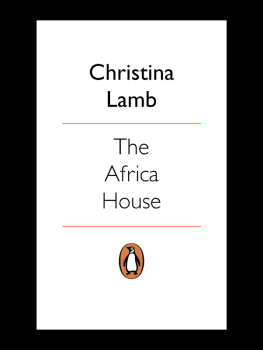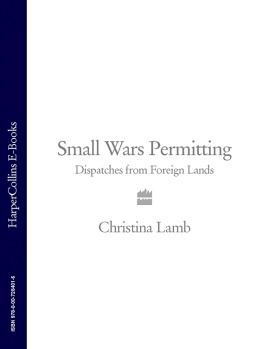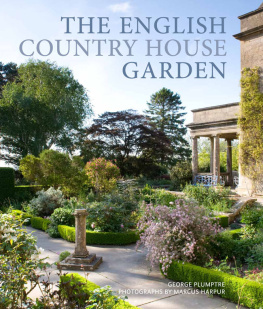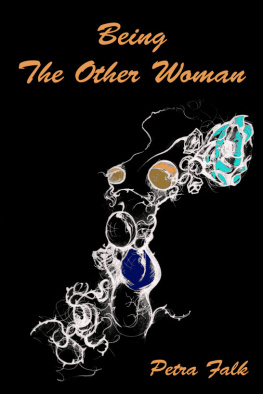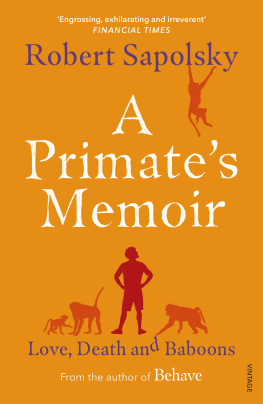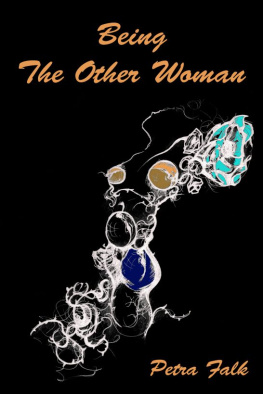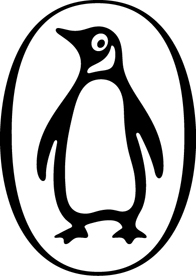Christina Lamb is an award-winning journalist who, after graduating from Oxford in 1987, lived overseas, as a correspondent for the Financial Times in Pakistan and Brazil, a Nieman Fellow at Harvard University, correspondent for the Sunday Times in South Africa and Diplomatic Correspondent for the Sunday Telegraph. In 2002 she was named Foreign Correspondent of the Year in the British Press Awards, Foreign Press Association and What the Papers Say awards. Her previous book, Waiting for Allah: Pakistans Struggle for Democracy, was published by Hamish Hamilton and Penguin. A fellow of the Royal Geographical Society, she is an inveterate traveller. She is currently Foreign Affairs correspondent for the Sunday Times and lives between London and Portugal with her husband and small son.
PENGUIN BOOKS
Published by the Penguin Group
Penguin Books Ltd, 80 Strand, London WC2R 0RL , England
Penguin Group (USA) Inc., 375 Hudson Street, New York, New York 10014, USA
Penguin Group (Canada), 90 Eglinton Avenue East, Suite 700, Toronto, Ontario, Canada M4P 2Y3 (a division of Pearson Penguin Canada Inc.)
Penguin Ireland, 25 St Stephens Green, Dublin 2, Ireland (a division of Penguin Books Ltd)
Penguin Group (Australia), 707 Collins Street, Melbourne, Victoria 3008, Australia (a division of Pearson Australia Group Pty Ltd)
Penguin Books India Pvt. Ltd, 11 Community Centre, Panchsheel Park, New Delhi 110 017, India
Penguin Group (NZ), 67 Apollo Drive, Rosedale, Auckland 0632, New Zealand (a division of Pearson New Zealand Ltd)
Penguin Books (South Africa) (Pty) Ltd, Block D, Rosebank Office Park, 181 Jan Smuts Avenue, Parktown North, Gauteng 2193, South Africa
Penguin Books Ltd, Registered Offices: 80 Strand, London WC2R 0RL, England
www.penguin.com
First published by Viking 1999
Published in Penguin Books 2000
Reissued with new material 2004
Copyright Christina Lamb, 1999, 2004
The moral right of the author has been asserted
All rights reserved.
ISBN: 978-0-141-96571-0
To Paulo
At ao fim do mundo
Christina Lamb
THE AFRICA HOUSE
The True Story of an English Gentleman and his African Dream
Introduction
The date etched on the heavy oak front door was 1923, but the house looked much older, its sloping tiled roof and arched terraces battered by the African sun and rains. A magnificent three-storey pink-bricked mansion, with a tower in the centre, a red tiled roof, and a line of elegant arches supporting a first-floor terrace from which a Union Jack fluttered limply. Rising behind it, a granite hill provided a dramatic backdrop. Part Tuscan manor house, part grand English ancestral home, and all completely unexpected and out of place in this remote corner of the African bush. Surely, only a madman or a megalomaniac could have built such a place.
The only obvious concessions to Africa were two carved wooden rhinoceroses acting as supports for a jutting side window, and the wooden crocodile over the top of the front door frame. The name was African too Shiwa House, called after the lake which we could just see glimmering blue in the distance. Those details aside, the house looked like something one might find in Surrey or Hampshire, belonging to a duke or a lord.
As we moved closer, I could see gaping holes in the roof where tiles had fallen, and some of the window-panes were cracked or spider-webbed over. The main gardens were quite neat, the air perfumed by the honeysuckle and bougainvillaea winding round a tall cypress tree, in and out of which flitted bee-eaters, tiny flashes of colour and sound. But to the side, what had once been a walled rose garden was a tangled mess, and a broken pathway led to an empty swimming-pool with a cracked concrete floor. The tennis court was long overgrown, and steps down to the village through a series of arches were choked with tropical creepers, casting a strange green light. It looked as if the African bush was wilfully trying to take back the house.
Peculiar things can happen over a gin and tonic in McGintys Pub at the Lusaka Holiday Inn, the Friday night watering-hole for the local expat community. On such a Friday in August 1996 I had been sitting on the hotel terrace overlooking the crocodile pool, entranced by the yellow male weaver-birds with beaks full of grass, engaged in their courtship ritual a sort of ongoing Ideal Nest Exhibition to try to lure the female of the species by threading circular nests which dangled basket-like from the branches. As the sun cocked a final red-eyed snook at the African dusk, setting off the electric hum of cicadas, I found myself in conversation with a safari guide with a shaven head. His name was Mark Harvey, he had shaved off his hair as a Zambian mark of respect for the death of a friend, and he told me the strangest tale of an abandoned house deep in the Central African bush.
The house, he said, had been built by his grandfather, an English soldier and aristocrat, in the early part of the century when Zambia was still Northern Rhodesia and the sun never set on the British Empire. It was in a remote part of northeastern Zambia called Shiwa Ngandu, which means Lake of the Royal Crocodiles, and one of these very crocodiles had devoured Livingstones little dog Chitane as the explorer passed through on his ill-fated last journey in search of the source of the Nile.
Explorers, crocodiles, mysterious lakes, aristocrats building dreams in the bush adventure beckoned. Livingstone is one of my heroes, and, whenever possible, I try to visit places where the great man trod. Besides, I had completed the work that had brought me to Zambia an interview with Kenneth Kaunda for the Sunday Times, conducted over tea which he does not drink but insisted on pouring himself, holding the teapot high to form a great arc of brown liquid, his trademark white handkerchief fluttering from the other hand. A long weekend prolonged by a National Farmers Day holiday stretched ahead before I could get a plane out.

